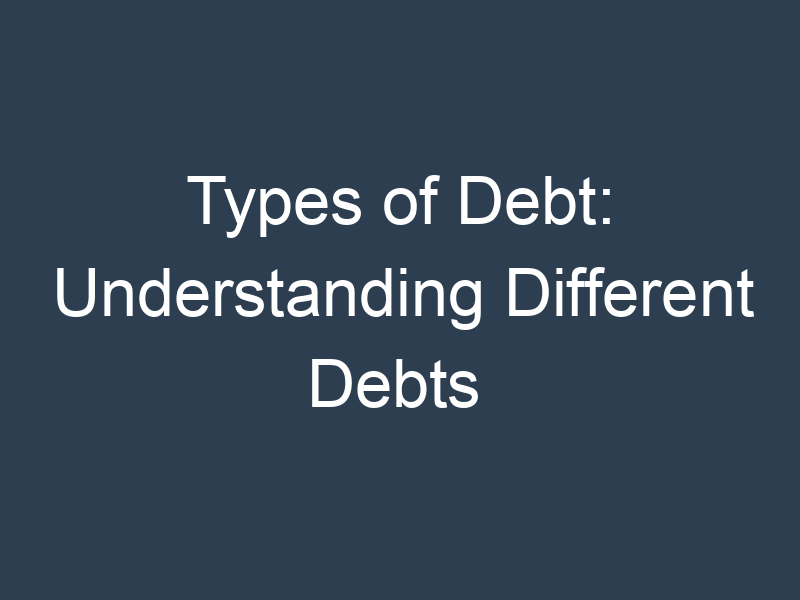Types of Debt: Understanding Different Debts
Debt is a financial reality that millions of people face daily. To navigate the complex world of debt effectively, it’s crucial to understand the various types of debt and the potential solutions available. In this in-depth article, we will delve into four primary categories of debt: secured debt, unsecured debt, revolving debt, and installment debt. Additionally, we will explore how the best debt settlement company CuraDebt, with its extensive experience and nationwide reach, offers customized solutions to clients’ unique needs. CuraDebt also provides free consultations to help individuals take the first step towards achieving financial stability.
What Are The Different Types Of Debt?
In the complex landscape of personal finance, individuals often find themselves contending with various types of debts, including secured, unsecured, revolving, and installment debts.
1. Secured Debt:
Secured debt is a type of debt that is backed by collateral, such as real estate, a vehicle, or other assets. If the borrower fails to make payments as agreed, the lender has the legal right to seize the collateral to cover the debt.
Types of Secured Debt:
Mortgages: A home loan secured by the property itself. In the event of non-payment, the lender can foreclose on the property.
Auto Loans: Loans used to finance the purchase of a vehicle where the vehicle itself serves as collateral. Failure to make payments can result in repossession.
Home Equity Loans: Borrowing against the equity in your home. The home is used as collateral, and it can be foreclosed upon in case of default.
Home Equity Lines of Credit (HELOC): Similar to home equity loans, HELOCs allow borrowers to use their home’s equity as collateral. The credit line can be tapped as needed, and the home is at risk if payments aren’t made.
Secured Personal Loans: Loans that require collateral, such as a savings account or certificate of deposit, to secure the loan. The collateral is used to cover the debt if the borrower defaults.
Secured Credit Cards: These are credit cards that require a security deposit, typically equal to the credit limit. The deposit serves as collateral and is used to cover unpaid balances if the cardholder doesn’t pay.
Boat and RV Loans: Loans used to finance the purchase of boats, recreational vehicles, or other large assets. The asset is used as collateral, and repossession can occur if payments are missed.
2. Unsecured Debt:
Unsecured debt, in contrast, does not involve collateral. Credit card debt, medical bills, and personal loans are typical forms of unsecured debt. Since there’s no collateral to secure these loans, interest rates tend to be higher, making unsecured debt more challenging to manage.
Types of Unsecured Debt:
Credit Card Debt: One of the most common forms of unsecured debt, where borrowers use credit cards to make purchases, with no collateral backing the debt.
Medical Bills: Unsecured debt that arises from medical expenses not covered by insurance, including doctor’s fees, hospital stays, and treatments.
Personal Loans: Loans taken out for various personal purposes, such as debt consolidation, home improvement, or vacations, without any collateral securing the loan.
Payday Loans: Short-term, high-interest loans typically used for emergency expenses but often leading to a cycle of debt due to their exorbitant interest rates.
Student Loans (some): While federal student loans are typically considered unsecured, private student loans may require a cosigner or collateral, making them secured debts in some cases.
How CuraDebt Can Help With Unsecured Debt:
Unsecured debt, including credit card debt, medical bills, personal loans, and more, can be particularly challenging to manage due to high-interest rates and various repayment terms. CuraDebt specializes in assisting individuals facing unsecured debt, offering tailored solutions primarily focused on debt settlement programs, professional debt negotiation and other debt relief programs. These services are designed to help individuals regain control of their finances and achieve debt relief.
Here’s how CuraDebt can Help With Unsecured Debt:
Debt Settlement Programs: CuraDebt’s team of professionals negotiates with your creditors to reach settlements on your unsecured debts. This involves agreeing to pay a reduced amount of the total debt in exchange for the debt being considered satisfied. Debt settlement can lead to significant savings and a faster path to debt freedom.
Professional Debt Negotiation: CuraDebt’s experts are skilled in negotiating with creditors on your behalf. They work to secure lower interest rates, reduced balances, or more favorable repayment terms for your unsecured debts, helping you regain control of your financial situation.
Customized Debt Solutions: CuraDebt understands that each individual’s financial situation is unique. Therefore, they provide customized debt solutions tailored to your specific needs. Their experts work closely with you to assess your financial circumstances, income, expenses, and the nature of your unsecured debt. This plan may include debt settlement, and other debt relief programs that are most suitable for your situation. By tailoring their approach to your needs, CuraDebt ensures that you have a realistic and effective path to tackle your unsecured debt.
Financial Education and Guidance: In addition to their debt relief services, CuraDebt places a strong emphasis on financial education and guidance. They understand that managing debt is just one aspect of achieving financial stability. By educating clients about sound financial principles, CuraDebt empowers individuals to make informed decisions, avoid future debt problems, and maintain a strong financial footing beyond their debt relief journey.
3. Revolving Debt:
Revolving debt is characterized by the borrower’s ability to continuously borrow funds up to a certain credit limit and make variable payments each month. Credit cards are a primary example of revolving debt. The outstanding balance can carry over from month to month, incurring interest charges.
Types of Revolving Debt:
Credit Card Debt: Borrowing against a credit limit with variable monthly payments.
Home Equity Lines of Credit (HELOC): Borrowing against the equity in your home with variable interest rates and payments.
Retail Store Cards: Cards issued by retailers that allow purchases on credit.
4. Installment Debt:
Installment debt encompasses various financial obligations where borrowers receive a fixed amount of money upfront and agree to repay it over a specified period through a predetermined number of equal payments.
Types of Installment Debt:
Auto Loans: Borrowers obtain financing to purchase a vehicle, and the loan is repaid through regular monthly installments over a predetermined term.
Mortgages: The most significant installment debt for many individuals, a mortgage is a loan used to purchase a home.
Personal Lines of Credit: Some personal lines of credit, often offered by banks or credit unions, function as installment debt.
Managing unsecured debt can be a daunting challenge, but CuraDebt offers a range of comprehensive solutions to help individuals regain control of their financial lives. Whether through debt settlement, professional negotiation, customized debt relief programs, CuraDebt’s goal is to provide you with the tools and support needed to achieve debt relief and long-term financial well-being. If you’re struggling with unsecured debt, consider reaching out to CuraDebt for a free consultation to explore the best approach to address your financial challenges and pave the way for a debt-free future.
Conclusion:
Understanding the various types of debt and seeking professional assistance when dealing with financial challenges is essential for achieving financial stability. CuraDebt, with its wealth of experience, nationwide reach, and commitment to providing customized solutions, stands ready to assist individuals in their journey toward debt relief. If you’re facing financial difficulties, consider taking advantage of CuraDebt’s free consultation to explore the best path to financial freedom. Remember, there are solutions available, and taking the first step toward debt relief can lead to a brighter financial future. Whether you’re dealing with secured or unsecured debt, a professional debt relief partner can help you navigate the path to financial recovery. CuraDebt also offers tax debt relief programs as well as business debt relief.








